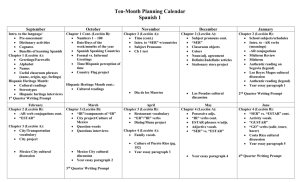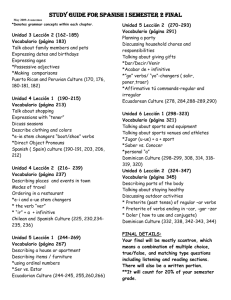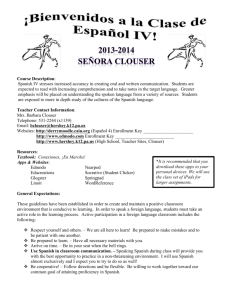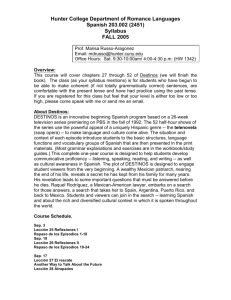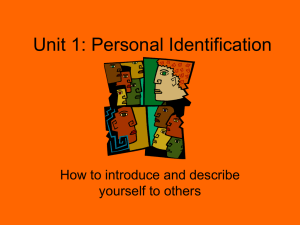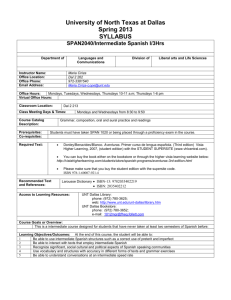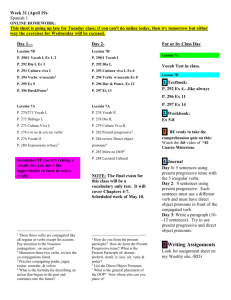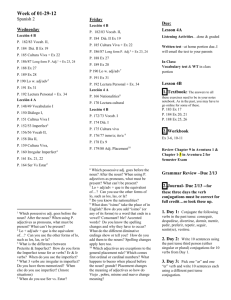CRN: 11858 - College of Charleston Blogs
advertisement
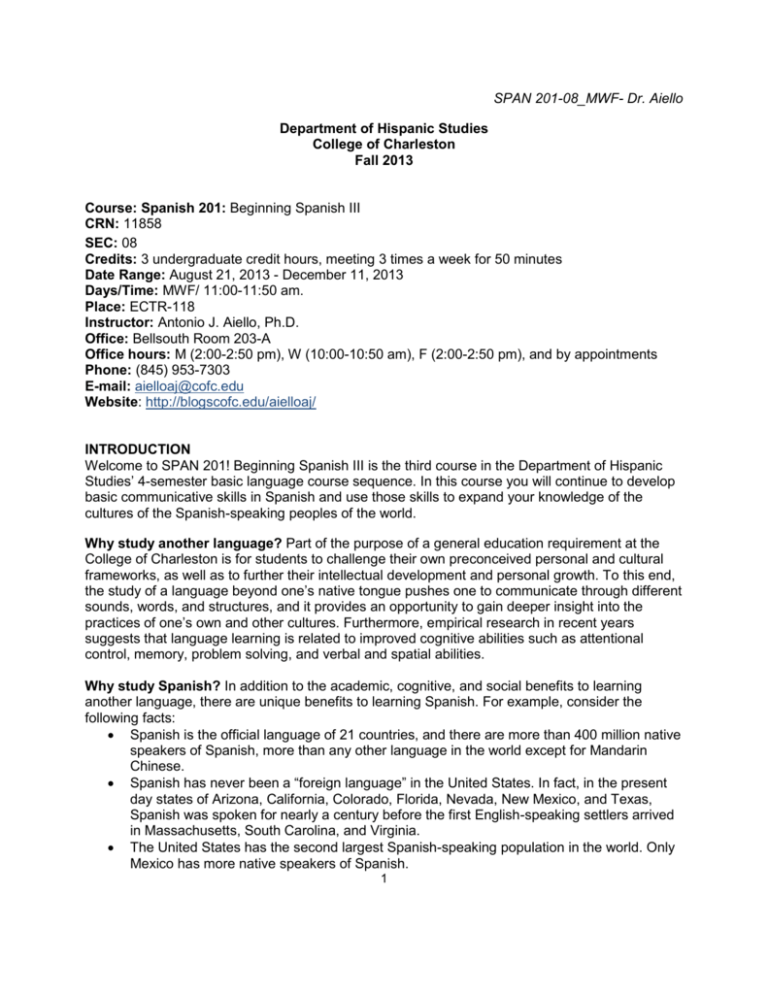
SPAN 201-08_MWF- Dr. Aiello Department of Hispanic Studies College of Charleston Fall 2013 Course: Spanish 201: Beginning Spanish III CRN: 11858 SEC: 08 Credits: 3 undergraduate credit hours, meeting 3 times a week for 50 minutes Date Range: August 21, 2013 - December 11, 2013 Days/Time: MWF/ 11:00-11:50 am. Place: ECTR-118 Instructor: Antonio J. Aiello, Ph.D. Office: Bellsouth Room 203-A Office hours: M (2:00-2:50 pm), W (10:00-10:50 am), F (2:00-2:50 pm), and by appointments Phone: (845) 953-7303 E-mail: aielloaj@cofc.edu Website: http://blogscofc.edu/aielloaj/ INTRODUCTION Welcome to SPAN 201! Beginning Spanish III is the third course in the Department of Hispanic Studies’ 4-semester basic language course sequence. In this course you will continue to develop basic communicative skills in Spanish and use those skills to expand your knowledge of the cultures of the Spanish-speaking peoples of the world. Why study another language? Part of the purpose of a general education requirement at the College of Charleston is for students to challenge their own preconceived personal and cultural frameworks, as well as to further their intellectual development and personal growth. To this end, the study of a language beyond one’s native tongue pushes one to communicate through different sounds, words, and structures, and it provides an opportunity to gain deeper insight into the practices of one’s own and other cultures. Furthermore, empirical research in recent years suggests that language learning is related to improved cognitive abilities such as attentional control, memory, problem solving, and verbal and spatial abilities. Why study Spanish? In addition to the academic, cognitive, and social benefits to learning another language, there are unique benefits to learning Spanish. For example, consider the following facts: Spanish is the official language of 21 countries, and there are more than 400 million native speakers of Spanish, more than any other language in the world except for Mandarin Chinese. Spanish has never been a “foreign language” in the United States. In fact, in the present day states of Arizona, California, Colorado, Florida, Nevada, New Mexico, and Texas, Spanish was spoken for nearly a century before the first English-speaking settlers arrived in Massachusetts, South Carolina, and Virginia. The United States has the second largest Spanish-speaking population in the world. Only Mexico has more native speakers of Spanish. 1 SPAN 201-08_MWF- Dr. Aiello OBJECTIVES AND COURSE DESCRIPTION By the end of the semester you will have increased your Spanish language vocabulary in topics related to daily activities, personalities, clothing, professions, and giving and receiving directions. You will also be better able to comprehend, and produce more accurately, grammatical forms and structures such as commands, the present perfect, the conditional, the present subjunctive, and the future tense. In addition, you will continue to practice with the present, the preterite, the imperfect, and reflexive verbs. CLASS FORMAT The format of this class is based on the premise that the best way to learn a foreign language is through repeated, meaningful exposure, as well as opportunities to interact with others, even at the beginning levels. Professors follow the policy of no English in class for themselves. It is up to you to seek clarification and raise your hand if you don’t understand something. Within about one week, you should be familiar with the class format and daily expectations. You are expected to arrive to class on time and actively participate. Furthermore, you are expected to be respectful of your peers and assist in the establishment and maintenance of a positive learning environment. REQUIRED MATERIALS Course Pack for SPAN 201, which contains the following: 1. ¿Sabías que...? Beginning Spanish. Custom Edition for SPAN 201 at the College of Charleston 2. Centro (Online Workbook/Manual to Accompany ¿Sabías que...?) NOTE: The Custom Edition of ¿Sabías que...? contains lessons 12-18 of the 5th edition. You will purchase one Course Pack each for 101, 102, and 201 (custom text and Centro access code), which over the course of the course sequence will be cheaper than purchasing the 5th edition and Centro access codes separately. The course pack is available at the College of Charleston Bookstore (Barnes and Noble) and the King Street Bookstore. Should you choose to purchase ¿Sabías que...? and Centro access codes separately (e.g., online), make sure that you purchase the 5th edition of the text and access to lessons 12-18 of Centro. GENERAL INFORMATION This course meets either 2- or 3-days a week. However, you will do a substantial portion of work outside of class through Centro, which supports the online workbook. Practicing with target vocabulary and grammatical forms /structures by means of a computer-enhanced course will provide the following advantages: Self-pacing. You can take the time you need to do the online portion of the course as long as you complete the assignments before the deadlines. Preparedness. Learning a language successfully requires consistent work and effort (not last minute cramming before an exam). Having to complete assignments in Centro on a regular basis will help you to keep up with the course material, to come to class better prepared, and will improve your chances of success in learning Spanish. 2 SPAN 201-08_MWF- Dr. Aiello Easy access. You can do your homework from any computer. First, you must create a user account. To do so, you will need the book key, which may be purchased from the College Bookstore. HOW TO USE CENTRO After being introduced to and engaged in focused practice with target vocabulary and grammar in class, you will complete several homework assignments in Centro. All Centro activities are due by 11:59pm on the dates specified on the Course Calendar (located at the end of this syllabus). The homework will be most effective if you read again the pages covered during class, and then do the assignments. Grading in Centro. You will be able to do each activity up to 2 times for a grade (before the due date/time), and Centro will automatically register your highest score in the gradebook. For example, if on your first attempt you score 7/10, and on your second attempt score 9/10, the 9/10 will be the score that posts to your Centro gradebook. The activity will remain available to you after the deadline has passed (although it will no longer count towards your grade). Therefore, you may do each activity as many times as you like, making this an excellent tool for preparing for exams. Creating an account. GO TO: www.mhcentro.com. CLICK ON “Create an account” and enter the following information: o Username: can be your CofC username or one you create o Password: can be your CofC password or one you create o First Name: MUST be your given name as it appears on your Cougar Card o Last Name: MUST be your last name as it appears on your Cougar Card o E-Mail Address: MUST be your CofC email o Country: United States o City: Charleston o State: South Carolina o Zip: 29424 o Time Zone: US/Eastern CLICK “Submit” Enter the course code (DFHGE936) and CLICK “Submit” Select your class (be sure it is the correct section number, location, and time) CLICK “Submit” Enter the book key (Manual) CLICK “Go” Instructions for Completing Centro Activities. To see the activities that are due, follow the steps below: 1. 2. 3. 4. Go to www.mhcentro.com – this will bring you to the “My Workstation” page. Click on the link to the workbook /manual. Click on the respective "Lección" (e.g., Lección preliminar) Click on the respective sub-lesson (e.g., 0.1 Ideas para explorar: ¿Quién eres?) 3 SPAN 201-08_MWF- Dr. Aiello 5. The activities with a green letter "A" next to them are the activities that are assigned, and the due date is listed below each activity. You may also click on “Calendar” at the top of the page to see assignments and due dates. In addition, the same information is listed on the Course Calendar (located at the end of this syllabus). *Be sure to submit your answers BEFORE 11:59 p.m. the night before the date listed on the Course Calendar. *You may monitor your progress by clicking on “My Results” on the “My Workstation” page. PARTICIPATION AND ATTENDANCE In order to meet the course goals and objectives, you must attend and actively participate in class. Participation is an important component of your final grade, and each day your professor will make a mark in their grade book regarding your participation (i.e., assign you a daily grade). If you miss class, no participation points can be awarded for that day. There is NO make-up for participation, with the exception of College-recognized religious holy days and properly documented College-sponsored activities that demand your presence. In these cases, students will not be counted as absent and will be awarded the full daily participation points. For religious holy days, students should speak with their professor prior to missing class. Exceptions may be made at the professor’s discretion in situations in which the absence is documented and/or extreme. The College of Charleston’s official policy on absences may be found at: http://blogs.cofc.edu/parents/2011/02/04/missing-classes-excused-absences-policy/ If you do not agree with the participation grade assigned for a particular day, you should speak to your professor immediately. Disputes over participation grades should not wait until the end of the semester since they are more difficult to document and handle then. Daily participation will be graded according to the following scale: 2 points Arrived on time, attended full class and participated in all activities using Spanish. Brought all required materials (including textbook) to class. 1 point Arrived after class had started, but not by more than a few minutes (3-4). Was not prepared, did not bring required materials, did not participate, and/or did not pay attention. Excessive use of English. 0 points Absent. Arrived more than 6 or 7 minutes after class had started (equivalent to an absence). Left early without instructor’s permission (equivalent to an absence). Disruptive: http://studentaffairs.cofc.edu/honor-system/classroom-disruption.php: o Do not cut classes, come in late or leave early. o Never leave during class unless you absolutely must. Leaving for a short break and then returning is not acceptable. o Turn off cell phones, pagers and all other electronic devices. o It is rude and unacceptable to talk with classmates while the professor (or another student who has the floor) is talking. 4 SPAN 201-08_MWF- Dr. Aiello o Visible and noisy signs of restlessness are rude as well as disruptive to others Please note that your professor reserves the right to count as absent and/or dismiss from class anyone who is disruptive, as defined by the Division of Student Affairs (see above). ABSENCE POLICY Excessive absenteeism not only affects your participation grade, but can also result in failure of this course. Students may miss a maximum of one week of class (i.e., 3 days for classes that meet 3-days-a-week class; 2 days for classes that meet 2-days-a-week class). An additional absence beyond this (i.e., 4 days for classes that meet 3-days-a-week; 3 days for classes that meet 2-days-a-week) will result in 10 points (i.e., 10%) being deducted from your grade in the course. Should you miss an additional class (i.e., 5 days for classes that meet 3-days-a-week; 4 days for classes that meet 2-days-a-week), you will receive a grade of WA (equivalent to an F). Exceptions will only be made in cases that are extreme. The College of Charleston’s official policy on attendance may be found at: http://catalogs.cofc.edu/undergraduate/attendance.htm ASSESSMENT AND GRADING SCALE Your grade in the course will be based on your performance in the following components: Lesson Exams (5) Online Homework Participation In-Class Speaking and Writing Cumulative Final Exam 40% (8% each) 15% 10% 20% 15% Exams. There will be 6 exams: 5 lesson exams and 1 comprehensive final exam. You are expected to take all exams on the days indicated in the syllabus. Centro. Successful language study requires a good bit of homework and it should be done on a regular basis. You need to have completed all assignments by 11:59pm on the due dates (see Course Calendar). The homework will be most effective if you first study the pages covered during class in your book. NOTE: Although you will not receive a grade for Centro activities completed after the due date has passed, you can re-do them for practice (i.e., in preparation for exams). Preparation, Attendance, and Participation. (see pp. 3-4) In-Class Speaking and Writing. This category includes 5 Speaking and Writing Assessments. Preparing for, attending, and participating in class on a regular basis is the best preparation for the Speaking and Writing assessments, which often times are based on the “Intercambios” (lesson-end tasks in the textbook). Although these assessments will be carried out in class with other peers, each student will be assessed individually using the following criteria: Speaking Rubric 5 SPAN 201-08_MWF- Dr. Aiello 10-9 Communicates very well. Is able to use appropriately target form(s) and vocabulary. Commits very few errors and is largely able to self-correct (either by self or if prompted). 8 Communicates well. Overall, is able to use appropriately target form(s) and vocabulary. Commits a few errors, but is able to self-correct most of them (either by self or if prompted). 7-6 At times is difficult to comprehend. Commits several errors, and is able to occasionally self-correct (either by self or if prompted). 5-4 Response is difficult to understand and reflects little to no preparation and/or response reflects English. 1-0 Student does not provide a response and/or responds in English. Writing Rubric 10-9 Communicates very well. Commits 0-1 error (in using target form(s) and vocabulary) and/or is able to correct said error if professor encourages them to reflect on why something may be wrong. 8 Communicates well. Commits a few errors (in using target form(s) and vocabulary), but is able to correct most of them if professor encourages them to reflect on why something may be wrong. 7-6 Writing is intelligible, but there are frequent errors (with target form(s) and vocabulary. Is able to correct some of them if professor encourages them to reflect on why something may be wrong. 5-4 Writing demonstrates poor usage of form(s) and vocabulary in target language and/or frequently incorporates English. 1-0 Application of target form(s) and vocabulary is unintelligible, reflects a large reliance on English, and/or is incomplete. The In-Class Speaking and Writing category may also include additional in-class activities (e.g., quizzes). MAKING UP MISSED WORK In addition to missing work because of a religious holy day or participation in a properlydocumented College-sponsored event, missed work may only be made-up if your absence is coded as “documented” in an “Absence Memo” e-mail from the Office of the Associate Dean of Students (67 George St.). You will not be able to make-up any missed work without documentation, unless your professor agrees that the circumstances are extreme. Please note that for a religious holy day or participation in a properly-documented Collegesponsored event, online homework assignments should be completed before the deadline. The College of Charleston’s official policy on absences may be found at: http://blogs.cofc.edu/parents/2011/02/04/missing-classes-excused-absences-policy/ 6 SPAN 201-08_MWF- Dr. Aiello GRADING SCALE The grading scale at the College of Charleston is as follows: A 93-100 B+ 87-89 C+ 77-79 D+ A90-92 B 83-86 C 73-76 D B80-82 C70-72 D- 69 66-68 65 F 64-0 NOTE: There are no opportunities for extra credit in this course STUDENTS WITH SPECIAL NEEDS The College of Charleston will make reasonable accommodations for persons with documented disabilities. The Center for Disability Services is located on the first floor of the Lightsey Center, Suite 104. If you are approved for accommodations, notify your professor as soon as possible. COLLEGE OF CHARLESTON HONOR CODE AND CODE OF CONDUCT You are expected to follow the College of Charleston Honor Code and Code of Conduct in all classes at the College of Charleston. Serious violations include (but are not limited to) giving or receiving unauthorized help on a test or assignment, plagiarizing (copying) work done by others, presenting work that you did not do as your own work, using electronic translation programs for the work in this course, and using cultural material without giving appropriate credit. Any serious violation of the Honor Code in this class will be reported to the Dean of Students and will be dealt with appropriately. If you have any questions about what constitutes your own work, please consult the Honor System website: http://studentaffairs.cofc.edu/honor-system/, and/or talk to your professor before turning in work for a grade. By remaining enrolled in this course past the end of Drop /Add, you are agreeing to: uphold the College of Charleston Honor Code, and accept accountability for the course. RECOMMENDATIONS FOR HOW TO BE SUCCESSFUL IN THIS COURSE Research in second language acquisition suggests that certain elements of language learning are more difficult for adults than they are for children. That said, everyone can be successful in learning a second /foreign language. To this end, the best way to do well in a Spanish course is to attend class and participate regularly, complete your homework assignments on time, and study for exams (which includes re-reading pages in the textbook and re-doing for practice online homework assignments listed on the Course Calendar). Your professor wants you to be successful in this course, and you should seek their clarification when necessary. You should feel free attend their office hours (or make an appointment), if desired. You should also feel free to attend the Foreign Languages Tutoring Lab, which is free, and is located in 113 Addlestone Library (Center for Student Learning). Their phone number is 953-8179. Please note that there are no opportunities for extra credit in this course. Conversation Classes. An optional conversation class, SPAN 201C, meets once a week for 50 minutes and is worth 1 credit. The classes are small (4-10 students) and offer additional speaking practice. You can register for this course through MyCharleston. 7 SPAN 201-08_MWF- Dr. Aiello Center for Student Learning: I encourage you to utilize the Center for Student Learning’s (CSL) academic support services for assistance in study strategies and course content. They offer tutoring, Supplemental Instruction, study skills appointments, and workshops. Students of all abilities have become more successful using these programs throughout their academic career and the services are available to you at no additional cost. For more information regarding these services please visit the CSL website at http://csl.cofc.edu or call (843)953-5635. 8 SPAN 201-08_MWF- Dr. Aiello COURSE CALENDAR Minor changes may be made and will be announced in class. It is the student’s responsibility to be aware of any changes. WK 1 2 DAY W 8/21 F 8/23 Centro Assignments *All activities due by 11:59pm on day specified* IN CLASS Introducción al curso Lección 12: ¿En qué consiste el abuso?: Hay que tener cuidado (¿Qué es una lesión?) SQ pp. 312-315. M 8/26 Lección 12: ¿En qué consiste el abuso?: Hay que tener cuidado (¿Veías la televisión de niño/a?) SQ pp. 316-319. W 8/28 Lección 12: ¿En qué consiste el abuso?: Saliendo de la adicción (¿Qué debo hacer? – Escucha esto.¿Qué no debo hacer? - ¡No hagas eso!) SQ pp. 324-328. F 8/30 EXAMEN: LECCIÓN 12 9 Due by Thursday of next week at 11:59pm: Lección 12, 12.1 Ideas para explorar: Hay que tener cuidado Actividad D: ¿Con qué frecuencia? Due by Thursday at 11:59pm: Lección 12, 12.1 Ideas para explorar: Hay que tener cuidado A: ¿Qué es? B: Acciones y resultados C: ¿Peligroso o dañino? Due by Thursday at 11:59pm: Lección 12, 12.2 Ideas para explorar: Saliendo de la adicción B: Perros y niños C: Conversaciones incompletas D: Más sobre perros y niños SPAN 201-08_MWF- Dr. Aiello 3 4 M 9/2 Lección 13: ¿Cómo te describes?: La personalidad (¿Cómo eres tú? (I)) SQ pp. 338-342. W 9/4 Lección 13: ¿Cómo te describes?: La personalidad (¿Cómo eres tú? (II)) La expresión de la personalidad (¿Qué has hecho? (I)) SQ pp. 343-347. F 9/6 Lección 13: ¿Cómo te describes?: La expresión de la personalidad (¿Qué has hecho? (II)) Más sobre tu personalidad (¿Te atreves a …?) SQ pp. 347-351. M 9/9 Lección 13: ¿Cómo te describes?: Más sobre tu personalidad (¿Es reflexivo?) SQ pp. 352-355. Vistazos culturales SQ pp. 358-360. W 9/11 Speaking and Writing Assessment 1 All students at same time (in groups of 2-3) Based on Intercambio pp. 356-357 F 9/13 EXAMEN: LECCIÓN 13 10 Due by Tuesday at 11:59pm: Lección 13, 13.1 Ideas para explorar: La personalidad A: Antónimos B: Asociaciones D: ¿Cómo es? Due by Thursday at 11:59pm: Lección 13, 13.1 Ideas para explorar: La personalidad E: Alternativas Due by Tuesday at 11:59pm: Lección 13, 13.2 Ideas para explorar: La expresión de la personalidad C: Un adolescente típico F: ¿Somos estudiantes activos? G: ¿Qué han hecho en clase? & Lección 13, 13.3 Ideas para explorar: Más sobre tu personalidad A: Definiciones D: Una acción E: ¿Qué hace? F: Situaciones SPAN 201-08_MWF- Dr. Aiello 5 6 M 9/16 Lección 14: ¿A quién te gustaría conocer?: La personalidad de los famosos (¿Qué cualidades poseían?) SQ pp. 362-366. W 9/18 Lección 14: ¿A quién te gustaría conocer?: Situaciones hipotéticas (¿Qué harías? (I)) SQ pp. 367369. F 9/20 Lección 14: ¿A quién te gustaría conocer?: Situaciones hipotéticas (¿Y si pudieras?) SQ pp. 369372. M 9/23 Lección 14: ¿A quién te gustaría conocer?: En busca de personas desconocidas (¿A quién…? ¿Te gustaría?) SQ pp. 373-376. W 9/25 Speaking and Writing Assessment 2 Half of the students this class, half the following class (in groups of 2-3) Based on Intercambio p. 377 F 9/27 Speaking and Writing Assessment 2 Half of the students this class, half the previous class (in groups of 2-3) Based on Intercambio p. 377 11 Due by Tuesday at 11:59pm: Lección 14, 14.1 Ideas para explorar: La personalidad de los famosos A: Antónimos B: Características semejantes C: Asociaciones Due by Thursday at 11:59pm: Lección 14, 14.2 Ideas para explorar: Situaciones hipotéticas A: Reacciones B: ¿Queremos un perro? C: En una situación parecida… Due by Sunday at 11:59pm: Lección 14, 14.2 Ideas para explorar: Situaciones hipotéticas E: Si fuera diferente la situación... Due by Tuesday at 11:59pm: Lección 14, 14.3 Ideas para explorar: En busca de personas conocidas A: Alternativas B: Gustos SPAN 201-08_MWF- Dr. Aiello 7 8 9 M 9/30 Lección 15: ¿Innato o aprendido?: De aquí para allá (¿Dónde está la biblioteca? ¿Cómo se llega al zoológico?) SQ pp. 382-388. W 10/2 Lección 15: ¿Innato o aprendido?: De aquí para allá (¿Cómo se llega al zoológico? cont.) (¿Por dónde? ¿Qué es lo curioso de esto?) SQ pp. 384-391. F 10/4 Lección 15: ¿Innato o aprendido?: Vamos a ver SQ pp. 391-396. M 10/7 W 10/9 F 10/11 Repaso M 10/14 W 10/16 Fall Break: No hay clase F 10/18 Lección 16: ¿Adónde vamos?: De viaje (¿Dónde nos quedamos?) SQ pp. 414-418. Due by Tuesday at 11:59pm: Lección 15, 15.1 Ideas para explorar: De aquí para allá C: ¿Qué se describe? D: Situaciones F: En el viejo San Juan Due by Sunday at 11:59pm: Lección 15, 15.2 Ideas para explorar: Lo interesante B: ¿Es lógico? C: Sugerencias D: Situaciones EXAMEN: LECCIONES 14-15 Lección 16: ¿Adónde vamos?: La ropa (¿Cómo te vistes? ¿Qué te pones?) SQ pp. 404-411. Lección 16: ¿Adónde vamos?: De viaje (¿En tren o en auto?) SQ pp. 411-414. 12 Due by Tuesday of next week at 11:59pm: Lección 16 16.1 Ideas para explorar: La ropa A: Algunas asociaciones B: ¿A quién se describe? C. Una conversación D. ¿Quién? E. Preguntas Due by Thursday at 11:59pm: Lección 16, 16.2 Ideas para explorar: De viaje A: Asociaciones Due by Sunday at 11:59pm: Lección 16, 16.2 Ideas para explorar: De viaje F: Un lugar para cada uno SPAN 201-08_MWF- Dr. Aiello 10 11 M 10/21 Lección 16: ¿Adónde vamos?: En el extranjero (Firme aquí) SQ pp. 418-420. W 10/23 Lección 16: ¿Adónde vamos?: En el extranjero (¿Qué harías? (II)) SQ pp. 420-423. F 10/25 Speaking and Writing Assessment 3 All students at same time (in groups of 2-3) Based on Intercambio p. 423 M 10/28 W 10/30 EXAMEN: LECCIÓN 16 F 11/1 Lección 17: ¿A qué profesión u ocupación quieres dedicarte?: Las profesiones (¿Qué tipo de trabajo buscas?) SQ pp. 435-439. Lección 17: ¿A qué profesión u ocupación quieres dedicarte?: Las profesiones (¿Qué profesión?) SQ pp. 429-434. 13 Due by Tuesday at 11:59pm: Lección 16, 16.3 Ideas para explorar: En el extranjero A: ¿Mandato o no? B: En el extranjero Due by Thursday at 11:59pm: Lección 16, 16.3 Ideas para explorar: En el extranjero C: ¿Qué harías tú? D: Si yo fuera el profesor (la profesora) de español... Due by Thursday at 11:59pm: Lección 17, 17.1 Ideas para explorar: Las profesiones (I) A: ¿Sí o no? B: Asociaciones Due by Sunday at 11:59pm: Lección 17, 17.1 Ideas para explorar: Las profesiones (I) F: Alternativas G: Busco un compañero (una compañera) de cuarto... H: Buscan... SPAN 201-08_MWF- Dr. Aiello 12 13 14 M 11/4 Lección 17: ¿A qué profesión u ocupación quieres dedicarte?: Las profesiones (II) (¿Qué características y habilidades se necesitan?) SQ pp. 439-441. W 11/6 Lección 17: ¿A qué profesión u ocupación quieres dedicarte?: Las profesiones (II) (No hay nadie que…) SQ pp. 441-442. F 11/8 Lección 17: ¿A qué profesión u ocupación quieres dedicarte?: Algunas aspiraciones (¿Qué piensas hacer cuando…?) SQ pp. 443-447. M 11/11 Speaking and Writing Assessment 4 All students at same time (in groups of 2-3) Based on Intercambio pp. 447 W 11/13 F 11/15 EXAMEN: LECCIÓN 17 M 11/18 Lección 18: ¿Qué nos espera en el futuro?: Las posibilidades y probabilidades del futuro (¿Es probable?¿Es posible?) SQ pp. 457-460. W 11/20 F 11/22 Repaso Lección 18: ¿Qué nos espera en el futuro?: Las posibilidades y probabilidades del futuro (¿Cómo será nuestra vida?) SQ pp. 453-457. Speaking and Writing Assessment 5 Half of the students this class, half the following class (in groups of 2-3) Targets subjunctive and future 14 Due by Tuesday at 11:59pm: Lección 17, 17.2 Ideas para explorar: Las profesiones (II) B: ¿Y con respecto a tus profesores? C: Profesiones y habilidades Due by Thursday at 11:59pm: Lección 17, 17.2 Ideas para explorar: Las profesiones (II) D: En la clase Due by Sunday at 11:59pm: Lección 17, 17.3 Ideas para explorar: Algunas aspiraciones A: Conversaciones B: Alternativas C: Opiniones D: Mi satisfacción futura Due by Sunday at 11:59pm: Lección 18, 18.1 Ideas para explorar: Las posibilidades y probabilidades del futuro C: Una conversación D: Unas preguntas Due by Tuesday at 11:59pm: Lección 18, 18.1 Ideas para explorar: Las posibilidades y probabilidades del futuro E: Los sueños del futuro F: Una conversación con dudas SPAN 201-08_MWF- Dr. Aiello 15 16 M 11/25 W 11/27 F 11/29 M 12/2 Speaking and Writing Assessment 5 Half of the students this class, half the previous class (in groups of 2-3) Targets subjunctive and future Thanksgiving Break: No hay clase Repaso EXAMEN FINAL (ACUMULATIVO) In our regular classroom See CofC Final Exam Schedule for Date and Time: http://registrar.cofc.edu/pdf/Exam_Schedule_Fall2013.pdf 15
